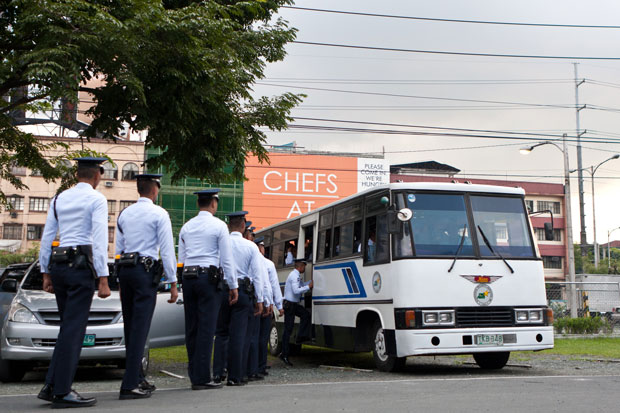
Harsh reality. After nine years of service, Leopard Security and Investigation Agency is leaving the Ateneo, after the university administration opted for a change in security agencies. Photo by Ryan Y. Racca.
It was approaching nightfall, and less and less people were entering the MVP building. Students were already on their way home, eager to enjoy the long weekend made possible by the August 19 holiday.
Security guard Joseph Banhao was at his usual desk, observing those who were still going in and out of the hall. It was just a matter of days before he finally leaves his post, yet nothing in his demeanor would seem to indicate this.
He consents with a nod and a soft smile when asked for a short interview; he didn’t need telling what the questions would all be about.
“May kalungkutan siyempre,” Banhao says, when asked how he’s doing just a number of days before he and his fellow guards finally leave Ateneo. (See “Security change divides LS opinion” for the full story.)
He has been working in the school for the past seven years, and he’s thankful of what he’s been able to accomplish through his job. He’s especially happy that he’s been able to put two of his children through college as an employee of his security agency.
“Kaso lang, sir,” he continues, as the interview went on, “medyo alanganin ‘yung pagka-terminate namin dito… Kung hindi ako makahanap kaagad ng malilipatan, baka matigil ‘yung graduating kong anak sa second sem.”
His voice was modulated by resignation. However, he expresses optimism that Leopard Security and Investigation Agency (LSIA) won’t just leave him and his colleagues with nothing to hold on to.
At least that’s something Banhao and his fellow contractual LSIA guards can remain hopeful about. Job insecurity is simply part of the reality of contractual labor, and not all contractual workers enjoy the same safety nets LSIA provides for its employees. In a lot of other cases, the lives of contractual workers literally just depend on some legal documents and the stroke of an executive’s pen.
“Ganu’n talaga pagdating sa kontrata, sir,” Banhao says. “Wala ka talagang magagawa kundi kung ano lang talaga ‘yung pinagkasunduan ng kliyente saka ng agency.”
Divided opinions
The administration’s recent decision to replace LSIA with Megaforce has elicited differing opinions from many student groups. The initial point of controversy was the supposed lack of consultation with the student body. This transformed what could have been just another business decision of the Ateneo into a full-blown controversy.
However, the administration has been criticized not only for failing to properly inform the students of the entire bidding process, but also of, as some allege, failing to sufficiently consider the welfare of the outgoing guards.
Indeed, up to now, the administration has released no official statement as to how it will aid the guards in their transition from the Ateneo to other establishments, despite clamor from some sectors for exactly this.
With this issue, the practice of contractualization has been dragged out onto school-wide scrutiny, as various student leaders and organizations offer widely divergent views.
“Preferential option”
One principle often appealed to by the students who position themselves with the LSIA guards is preferential option for the poor, an idea often taught and discussed in core theology classes.
Some believe that the time given to the guards to transition from the Ateneo to another assignment is too short, and that some guards may not even be given new job opportunities after leaving their assignments here. This is because other establishments have certain employment requirements that the Ateneo does not have, such as height and age specifications.
That’s the thing about contractualization—it’s very quantitative. – Miguel Rivera, party premier of Crusada
Miguel Rivera, party premier of the Christian Union for Socialist and Democratic Advancement (Crusada), argues that the students must be one with the guards at this time, as the entire ordeal is proving to be difficult for them. “They were responsible for us, and now we should assume responsibility for them,” he says.
Contrary to what some might think, LSIA actually leaves the Ateneo with an impressive record. Their performance over the years has been commended by the parents’ association, and they even have an extensive list of recorded cases of honesty.
With this reasonably good track record, some sectors therefore question the necessity of the administration’s decision to hire a new security agency, especially given the hardships such a change would cause on the guards.
“I think, as an Atenean, [the decision] directly runs contrary to our values as an institution,” Rivera says. He points to a seeming inconsistency in how students deal with different social or political issues.
On one hand, the student body rallies against the construction of the SMDC Blue Residences, a project by one of the biggest exploiters of contractual labor in the country. On the other hand, here at the very heart of the Ateneo, little attention is directed towards the administration’s own questionable business practices.
“If in our own campus, we are not able to identify who the other is, and we’re not capable of being men for others inside this campus, what more outside?” Rivera asks.
A business decision
However, the logistical aspect of contractualization still has to be taken into account. This aspect was clearly significant in the administration’s eventual decision to move to another security agency.
Logistics- and finances-wise, one incentive offered by contractual labor is the attractive figures: the least possible funds for the most cost-efficient manpower.
“That’s the thing about contractualization—it’s very quantitative,” says Rivera. “This entire thing is a sign that the Ateneo as an institution is actually at a crossroads. It has its humanistic values, but then it also has to answer the calls of globalization.”
Meryl Uy, the president of the Ateneo Economics Association, explains that contractualization is a form of exploitation in “countries with high rates of unemployment… Employers take advantage of the market’s surplus labor by affording themselves [of] cheap labor.”
“With thousands unemployed and desperate to make ends meet,” Uy explains, “employers are able to solicit labor despite providing jobs with poor pay and without the benefits of regular employees.”
When asked whether she thinks the practice of contractualization is in line with what is taught in the Ateneo’s classrooms, she says, “[If] the Ateneo administration chose to change agencies to afford themselves with cheaper labor, [we must] condemn this act of hypocrisy.
Leo Camacho, the president of the Ateneo Management Association, argues for a need to consider the intent of both parties. “The Ateneo admin must have had a compelling reason for it to decide the change of security agencies,” he says.
“However,” he continues, “we must be cautious about the issue of contractualization because it can be used to abuse the rights of workers.”
Vulnerable conditions
How the Ateneo administration will balance the two seemingly contending forces of deep-seated convictions and economic practicality is likely to manifest in how it will go about its business decisions, such as in this matter of school security.
One point of argument that arose during the many debates regarding the issue was the assertion by some people that the terminated guards can just simply look for other jobs. This assertion stems from allegations that the student body are selective when it comes to these issues; the separation with LSIA was a big deal but when one secretary or a teacher is fired, hardly anyone even notices.
Council of Organizations of the Ateneo President Ken Abante, however, counters these criticisms. “Admin would say that [the separation with LSIA is just] similar to… teachers [being] laid off. [So the admin would ask,] ‘do the students really need to be consulted?’,” he says in mixed English and Filipino.
Abante explains that it is important to consider how guards are unlike tenured professors—they do not possess the luxury of falling back to a college degree in their resume on the occasion that they have to look for a new job. Most contractual workers are subjected even to height and age restrictions, and they must solely rely on previous work experience to make decent job applications.
The Ateneo requires an engagement program for juniors, wherein students spend 12 hours living as the proletariat does—they assume the roles of SM baggers vendors, street sweepers, jeepney barkers, parking attendants, etc.
Contractualization is often one of the harsh realities these students’ eyes are opened to throughout these 12 hours. However, with such business practices happening right inside the campus, it seems that Ateneans don’t even have to go so far to see what the world is like down the hill.








